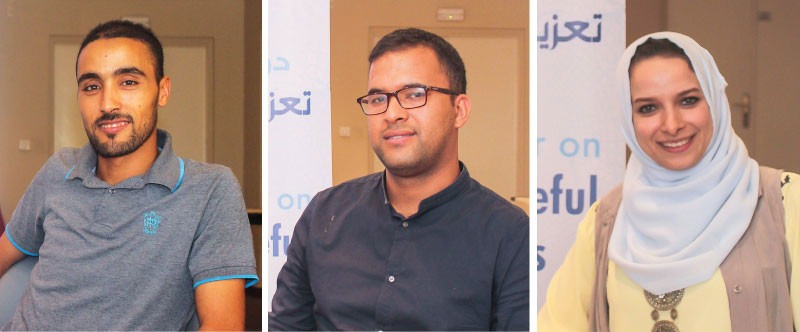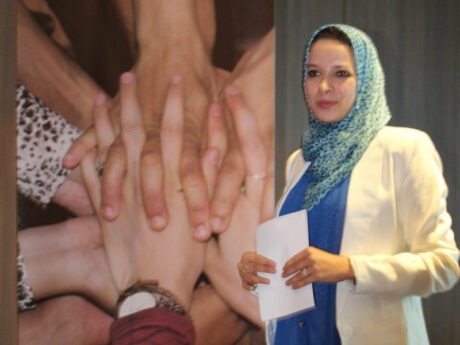To stem violent extremism, solutions must be tailored to local drivers and needs, said three Moroccan leaders on the frontlines of community-based efforts to counter violent extremism.
Hailing from neighborhoods with high levels of violent extremist activity and recruitment in the cities of Fès, Salé and Casablanca, the religious and civil society leaders have assessed local risk factors for violent extremism and implemented tailored interventions as part of the Fostering Peaceful Communities in Morocco project. They shared their insights with CVE practitioners in Washington, D.C. at the Alliance for Peacebuilding on March 22.
From preparing religious students to prevent extremism to training unemployed mothers to recognize the signs of radicalization, the interventions had two critical characteristics in common that made them successful, according to Yasmina Sarhrouny, Chief of Party for the project, which is implemented by Creative Associates International and funded by the U.S. Department of State’s Bureau of Conflict and Stabilization Operations. They were locally driven and collaborative.
“As CVE practitioners, we see a lot of projects that succeed and many others that don’t because they are designed elsewhere. They are cookie cutter or they don’t necessarily bring all of the players together around the table,” said Sarhrouny.

Local needs, local solutions
Across the panelists’ three communities, religious and civil society leaders came together to understand local risk factors for extremism and design smart interventions to mitigate them.
For example, panelist Abdeljalil Anouar and his Casablanca team found a lack of religious knowledge to be a risk factor for extremism, while religious literacy could be a force for prevention. With this insight, they decided to equip the next generation of religious leaders with tools to positively educate their communities and support prevention.
“We chose to work with the students of the Hassan II School for Islamic Studies because they were already enabled with the technical skills but we could enable them with the soft skills and communication skills to work better in their communities,” said Anouar, who is a high-school Arabic teacher in addition to his work with this initiative.
The project marks the first time Hassan II Mosque has collaborated with an international organization on a CVE-focused project.
In Salé, the local team discovered that no organizations were working with women and mothers on CVE, therefore missing a critical opportunity to bolster prevention. They designed a program to equip women with tools to prevent radicalization within their families and communities.
The program trained 60 mothers and unemployed young women on how to detect hate speech and signs of extremism, recognize signs of radicalization and provide psychological support to loved ones at risk for radicalization.
“It was received very positively,” said panelist Abdelilah Abdellaoui, a civil society leader who supported the initiative. “Most of the mothers went back to the community with the training and what they did in the classroom. Often, they came back telling us about a friend or a neighbor who wanted to do the training as well.”
Abdellaoui’s group is currently developing a CVE manual of the course material that will be shared with the broader community.
In Fès, panelist Soukaina Sriti, a civil society leader, is deploying an educational and human rights approach to promote a culture of tolerance in four secondary schools. The program engaged youth who were at elevated risk of radicalization, teaching them how to engage more positively and peacefully with their peers, their schools, and their communities.
The Fostering Peaceful Communities project is also operating in Beni Mellal, though the representative of this town could not attend the event. The Beni Mellal team works with under-educated youth and adults exposed to violence and radical discourse, helping them to build their life skills, enhance resilience and improve their sense of belonging in the community.
By working through local organizations that had already garnered trust and buy-in in their communities, the project could effectively reach individuals at the greatest risk for radicalization and the community members best able to support those at-risk individuals in their families and neighborhoods, said Sarhrouny.
She added that it was also essential to bring local government officials on board from the beginning and to keep them engaged in the process. This both helps to dispel suspicions about the program and to build the partnerships and capacity to support sustainable CVE efforts. Through this collaboration, she says elected officials have begun to reshape their conceptions of CVE as something larger than law enforcement.
“They began to see that it takes looking at youth engagement, citizen engagement and getting to these kids so they aren’t at risk before they go toward extremism,” she said.

Changing attitudes
Across all four initiatives, panelists reported that the most significant change they observed in participants was a change in attitude about the nature of violent extremism and their role in helping to prevent it.
“Students changed their idea on extremism,” said Soukaina Sriti, who led the secondary school workshops in Fès. “In the beginning they though that extremism was something only related to religion, but in the end evaluation they connected hate to extremism in other forms.”
She noted that the youth also made plans to pass on what they had learned to their peers through similar workshops.
As the Fostering Peaceful Communities in Morocco project continues to measure the impact of these four initiatives, it is the change of attitudes that symbolizes a major step forward for preventing and countering violent extremism, said Chief of Party Sarhrouny.
“When you get into these types of trainings, when mothers start understanding and having these conversations among themselves, for example, that is the big change of attitude that can make a big difference in a community,” she said.

